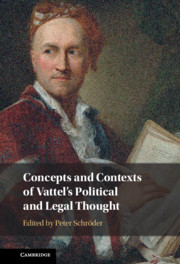Book contents
- Concepts and Contexts of Vattel’s Political and Legal Thought
- Concepts and Contexts of Vattel’s Political and Legal Thought
- Copyright page
- Contents
- Contributors
- Acknowledgements
- Concepts and Contexts of Vattel’s Political and Legal Thought
- Part I Historical and Intellectual Contexts
- Part II Concepts
- 6 Vattel, the Balance of Power, and the Moral Justification of War
- 7 Regular War, Irregulars, and Savages
- 8 Constitutionalism
- 9 Vattel’s Theory of the Social Contract
- Part III Receptions
- Index
- References
7 - Regular War, Irregulars, and Savages
from Part II - Concepts
Published online by Cambridge University Press: 11 June 2021
- Concepts and Contexts of Vattel’s Political and Legal Thought
- Concepts and Contexts of Vattel’s Political and Legal Thought
- Copyright page
- Contents
- Contributors
- Acknowledgements
- Concepts and Contexts of Vattel’s Political and Legal Thought
- Part I Historical and Intellectual Contexts
- Part II Concepts
- 6 Vattel, the Balance of Power, and the Moral Justification of War
- 7 Regular War, Irregulars, and Savages
- 8 Constitutionalism
- 9 Vattel’s Theory of the Social Contract
- Part III Receptions
- Index
- References
Summary
One of the most appalling uses of standards of civilization in international legal history is the two-tiered construction of the laws of war in the nineteenth century. The international legal profession in Europe and other ‘civilized nations’ took ‘savages’ to be incapable of showing restraint in warfare, and as such beyond the pale of the limiting rules of civilized, regular warfare. International lawyers sanctioned the deployment of unlimited violence by European powers against non-Europeans in colonial wars; legal norms that were well established in European practice, such as giving quarter to combatants and sparing women and children from deliberate attacks, were deemed inapplicable in such radically asymmetrical wars.1
- Type
- Chapter
- Information
- Concepts and Contexts of Vattel's Political and Legal Thought , pp. 141 - 160Publisher: Cambridge University PressPrint publication year: 2021



